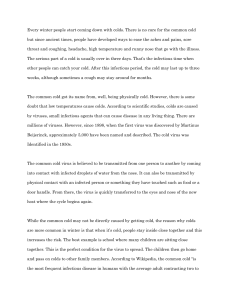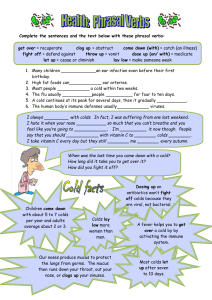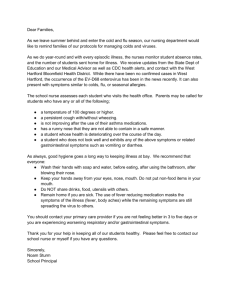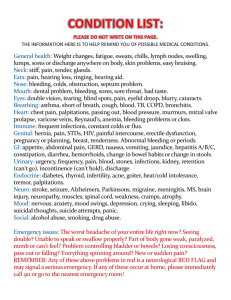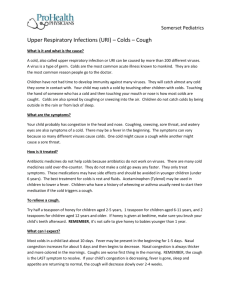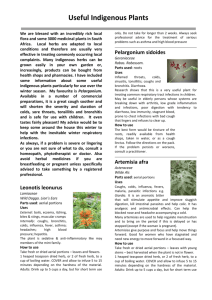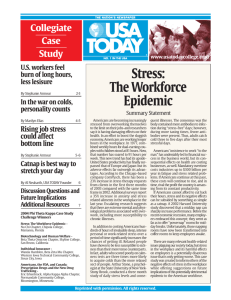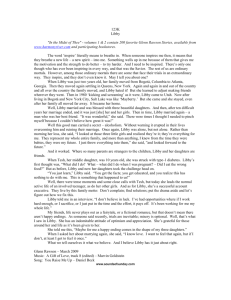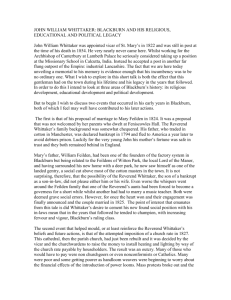The common cold (adults) - Grosvenor Medical Centre
advertisement
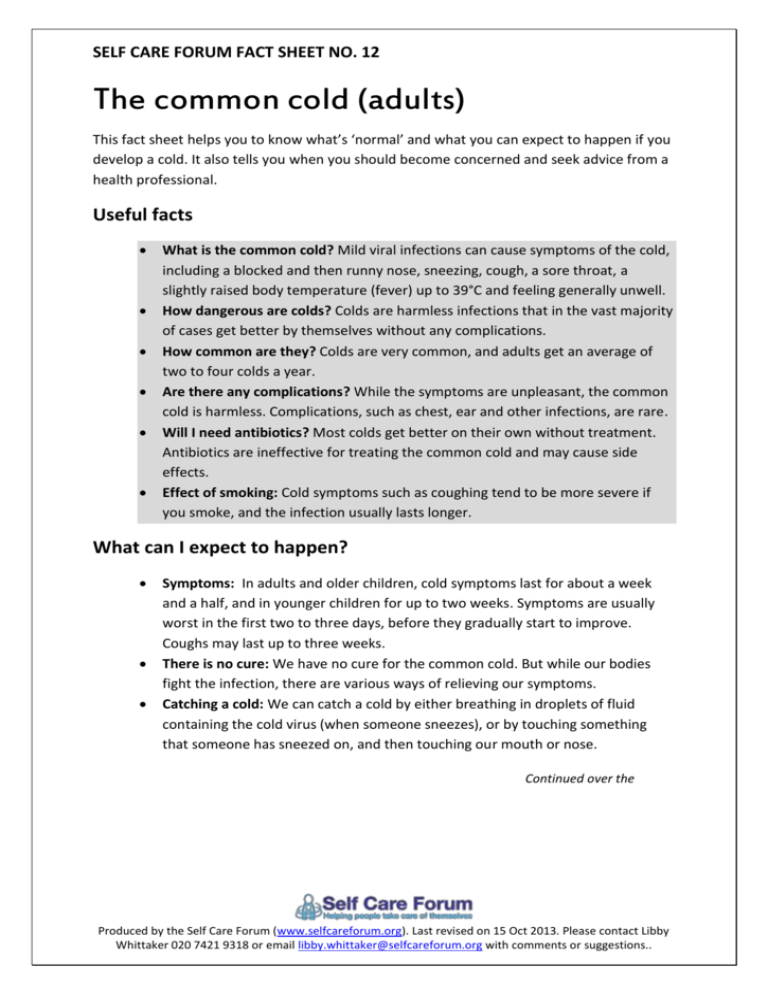
SELF CARE FORUM FACT SHEET NO. 12 The common cold (adults) This fact sheet helps you to know what’s ‘normal’ and what you can expect to happen if you develop a cold. It also tells you when you should become concerned and seek advice from a health professional. Useful facts What is the common cold? Mild viral infections can cause symptoms of the cold, including a blocked and then runny nose, sneezing, cough, a sore throat, a slightly raised body temperature (fever) up to 39°C and feeling generally unwell. How dangerous are colds? Colds are harmless infections that in the vast majority of cases get better by themselves without any complications. How common are they? Colds are very common, and adults get an average of two to four colds a year. Are there any complications? While the symptoms are unpleasant, the common cold is harmless. Complications, such as chest, ear and other infections, are rare. Will I need antibiotics? Most colds get better on their own without treatment. Antibiotics are ineffective for treating the common cold and may cause side effects. Effect of smoking: Cold symptoms such as coughing tend to be more severe if you smoke, and the infection usually lasts longer. What can I expect to happen? Symptoms: In adults and older children, cold symptoms last for about a week and a half, and in younger children for up to two weeks. Symptoms are usually worst in the first two to three days, before they gradually start to improve. Coughs may last up to three weeks. There is no cure: We have no cure for the common cold. But while our bodies fight the infection, there are various ways of relieving our symptoms. Catching a cold: We can catch a cold by either breathing in droplets of fluid containing the cold virus (when someone sneezes), or by touching something that someone has sneezed on, and then touching our mouth or nose. Continued over the page Produced by the Self Care Forum (www.selfcareforum.org). Last revised on 15 Oct 2013. Please contact Libby Whittaker 020 7421 9318 or email libby.whittaker@selfcareforum.org with comments or suggestions.. SELF CARE FORUM FACT SHEET NO. 12 What can I do – now and in the future? Simple measures: Get some rest until you feel better – we usually know when we’re well enough to return to normal activities. Diet and fluids: Eat healthily, including at least five portions of fruit and vegetables every day. Drink plenty of fluids to replace those lost from sweating and a runny nose. Over the counter medicines: Paracetamol, ibuprofen or aspirin can help reduce the symptoms of a cold. Avoid giving aspirin to children under the age of 16 and follow the manufacturer’s instructions. Talk to your pharmacist about supplements that may help ease your symptoms. When should I seek medical help? Most colds are not serious and get better by themselves. Contact your GP surgery for urgent advice if you notice one or more of the following: You develop a high temperature (above 39°C or 102.2°F), which can be a sign of a more serious type of infection; You’re confused or disorientated; You notice a sharp pain in your chest; You cough up blood-stained phlegm (thick mucus); You find it difficult to breathe; You notice a marked swelling of the glands in your neck and/or armpits; Your symptoms last longer than three weeks. Where can I find out more? Visit NHS Choices (http://www.nhs.uk/Conditions/Cold-common/Pages/Introduction.aspx) or Patient.co.uk http://www.patient.co.uk/health/Common-Cold.htm for more information on what you can do if you suffer from a cold. Remember that your pharmacist can also assist you in assessing your symptoms. Produced by the Self Care Forum (www.selfcareforum.org). Last revised on 15 Oct 2013. Please contact Libby Whittaker 020 7421 9318 or email libby.whittaker@selfcareforum.org with comments or suggestions..
